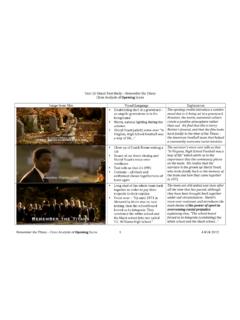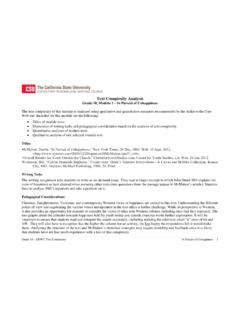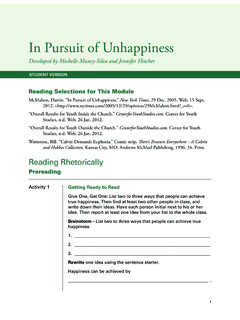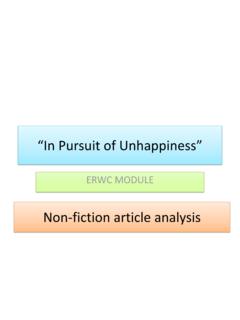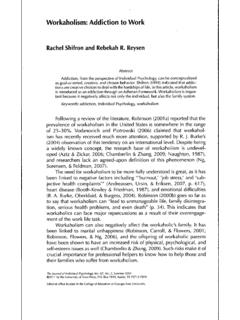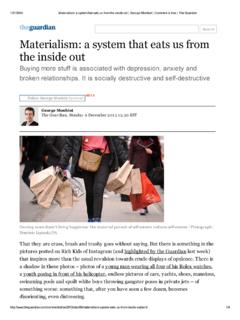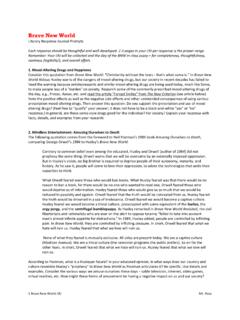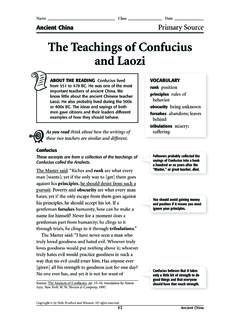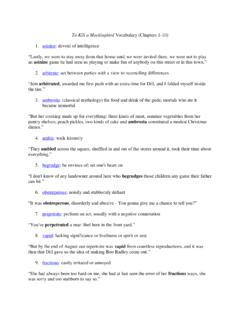Transcription of American Beauty by Sam Mendes - Kirk's English Weebly
1 American Beauty by Sam Mendes Summary and Analysis Mendes ' influence on American Beauty The original script for American Beauty was markedly different from the finished product (the shooting script). The script that Alan Ball, the screenwriter, sent to Sam Mendes , the director, began with Jane and Ricky being put on trial for the murder of Lester Burnham. In the original script, Angela testifies against Jane in court, and Colonel Fitts brings in the tape he finds of Jane offering Ricky three thousand dollars to kill her father. The viewers learn that the tape was a joke immediately after Ricky turns off the camera - but one second too late for the defense. Also, the extended shot over the town with Lester's voice-over in the background that begins the shooting script originally included Lester in his pajamas, flying Superman-like over the town and landing in his own bed. Mendes filmed the script almost as written, but afterwards he and editor Tariq Anwar made substantial changes, to the surprise of most of the cast and crew.
2 Mendes cut the trial out entirely, and also eliminated the "Lester-flying" fantasy. He preserved Ricky and Jane's impact on the film by increasing their on-camera time throughout the movie. Mendes ' cuts had a tremendous affect on the themes and impact of the story. The question of guilt and the manipulation of evidence played a large role in the original film, but by editing out the trial Mendes shifted the focus from Lester Burnham's death to Lester Burnham's life. In hindsight, it seems possible that the original script would have produced a more unbalanced, less poignant film than the final product. Of course the universally exceptional work turned in by the actors was an important component in the film's success, but Mendes ' cuts also had a significant influence on how these roles were perceived. In shifting the ultimate meaning of the film, Mendes essentially turned all of the roles into "character parts" rather than mainstream leading roles. It seems likely that Mendes ' background as a theatre director strongly influenced his approach to American Beauty .
3 Mendes was used to directing stories that focused on character development and questions of perspective rather than a rapidly-moving plot. Furthermore, his work on the stage may have made him more comfortable with the less realistic aspects of American Beauty (such as Lester's fantasy sequences). Another aspect of Mendes ' background that may have influenced his choices for the film is the fact that he is a British - rather than an American - director. Generally speaking, character-driven films are more widely accepted in Britain than they are in the United States. While American blockbusters are unquestionably popular in the , British directors seem to have more freedom to explore characters who are not particularly admirable, important, or even likeable. In transforming American Beauty from a whodunit thriller into a deeply cerebral exploration of the human condition, Mendes went against the stereotypes that were thought to appeal to American audiences. Major Themes Happiness Happiness exists in American Beauty as a myth, as a goal, and as a disguise.
4 All of the characters are engaged in the pursuit of happiness, although they have very different ideas about what happiness is and how to find it. This is one of the qualities that truly make American Beauty a film about the modern American experience: if being American means having the intrinsic right to the pursuit of happiness, why is the "typical" American so deeply unhappy? At the beginning of the film, Lester Burnham realizes that despite the dire nature of his current state, it is still possible for him to become happy once again. Slowly - and then with growing intensity - he begins to pursue happiness by paying close attention to his true desires, and ignoring the screeching dictates of society (as embodied by his wife, Carolyn). At the close of the film, Lester finally realizes that he has found true in the most unlikely way. What makes this film so unique is that Lester pursues happiness in a manner that runs directly counter to the ideals of "respectable" society: he does drugs, takes a meaningless job, and pursues a sexual affair with a fifteen-year-old girl.
5 Lester has become so blinded by his willingness to walk the straight and narrow that he must return to a fundamental - and arguably juvenile - state in order to recapture the happiness that he once enjoyed. Meanwhile, Carolyn Burnham represents the commonly-held belief that happiness is about perception: she is happy if she seems pulled together, confident, and successful - in other words, she is happy if others think that she is happy. She believes that by pursuing success she is pursuing happiness, but in reality she is merely attempting to dampen her own misery over the wreckage of her marriage and the narrowness of her life. Her daughter Jane, in contrast, is completely immersed in her misery. She displays it for all to see, from the clothes she wears to the company she keeps. Jane is so used to living in a state of perpetual unhappiness that when she meets Ricky she continues to obsess about her terrible home life despite the fact that Ricky's situation is clearly far worse.
6 Ultimately, American Beauty endorses the pursuit of happiness as the only thing worth living for. At the end of the film, Lester's murder seems almost inconsequential; how can Lester's end be viewed as a tragedy when he was lucky enough to know true happiness in the months before he died, and when so many others never know it at all? Identity Many of the characters' problems stem from their failure to develop or maintain a coherent identity. Lester finds happiness by separating his sense of self-worth from his job and his home life. He learns that even though his boss and wife treat him as though he's worthless, that doesn't mean that he is. Angela believes that her identity is founded entirely on her sexuality. She fears being "ordinary" because she has confused ordinariness with physical plainness, and has confused physical plainness with having no identity. Carolyn Burnham is one of the film's most tragic characters because she has literally replaced her identity as a person with a collection of material things.
7 Carolyn Burnham has a perfect suit, an expensive couch, and a new car, but she has lost the vivacious personality that Lester Burnham fell in love with. When he attempts to remind her of how she once was, she viciously defends her current state, thus protecting her belief that her priorities are in order and that she is successful because she possesses the "important" things in life. Ricky is the one character who does not fall victim to this problem of identity: his awe-inspiring strength comes from his ability to retain a clear sense of self despite constant abuse from his father. Even when he discovers that his father's love is truly conditional, Ricky is able to fearlessly pursue Jane's love and acceptance. The power of identity is underscored by Lester Burnham's death. Colonel Fitts kills Lester because he has revealed his true self to him, and cannot bear the idea that some part of himself - a part that he has always tried to keep hidden - has been exposed.
8 In killing Lester, the Colonel preserves an identity that he can live with, albeit a false one. American Culture From its title to its allusions to several iconic American texts, American Beauty explores different aspects of American culture and American identity. The title refers to three different symbols of American culture: American Beauty roses (a popular variety), Angela as a representative of youthful, innocent, " American " loveliness, and the American aesthetic of Beauty , as represented by Ricky's films. Lester Burnham has distinct similarities to Willy Loman, the everyman protagonist of Arthur Miller's Death of a Salesman. Lester, cognizant of his situation, reinvents his life in order to save himself from a similar end. Carolyn Burnham represents American consumerism and the unfortunate belief that things can replace relationships. Lester's job at a fast-food restaurant and Jane's participation on the cheerleading team (both "typical" American roles) inject a humorous note into Mendes ' discussion of American culture.
9 All the same, American Beauty forces the viewer to consider whether there is anything worth saving at the root of this culture. When American Beauty was released abroad, many critics were surprised that Americans responded so positively to a film that seemed so critical of traditional American values. Americans, it seems, were ready to question these values much as Lester does in the film, and move towards a more satisfying, emotionally fulfilling existence. Love It is the absence - rather than the presence - of love that is most noticeable in the first half of American Beauty . The Burnham family dinners simmer with anger and awkwardness: these are people who have fundamentally forgotten how to love each other. One of the saddest moments of the film occurs at the end, when Carolyn, faced with her husband's death, realizes that she will never again have the chance to love him. One of Ricky's most astounding characteristics is his apparent belief that his father loves him despite how he treats him, and that the beatings and the lack of trust are simply his unique way of showing this love.
10 Ricky's ability to love Jane stems from this remarkable ability to trust in the inherent goodness of others. On the whole, Mendes seems to portray love as unexpected, miraculous, incredibly, incredibly important. Lester finds happiness not only because he learns to love himself, but because in loving himself he falls in love with life all over again. His newfound appreciation for the world around him enables him to look at Carolyn's face, lined with years of frustration and bitterness, hear the horrible things she says to him, and still smile at the memory of the happy, funny, lively woman he once knew. Once he has found all of that love inside him, Lester finds it impossible to hate. Freedom Freedom, of course, is another fundamental American ideal. While happiness is a more overt theme in American Beauty , the theme of freedom is significant precisely because free will is so rare and difficult to locate. One of the unifying characteristics in the film is that so many of the characters seem trapped: trapped by their lives, their jobs, themselves, their parents, and their fears.
